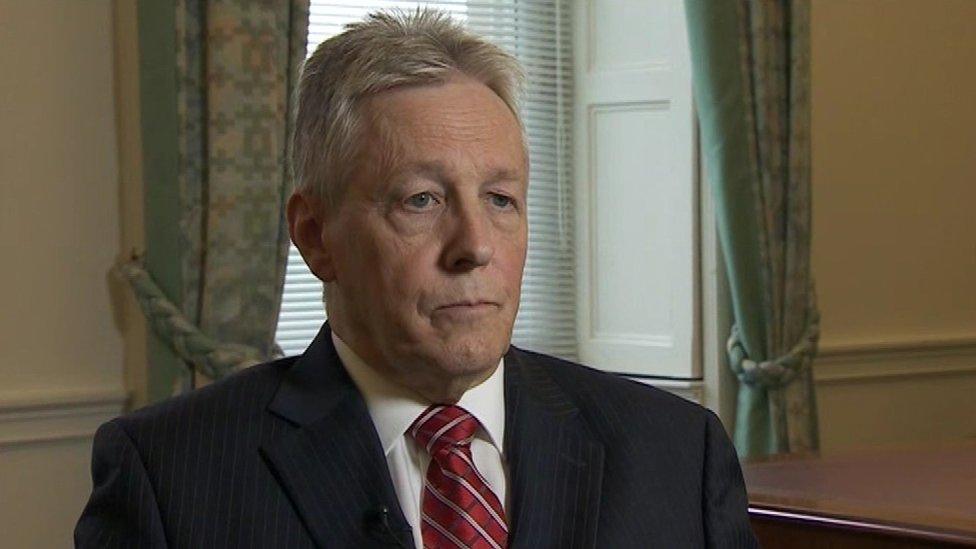Peter Robinson: Timeline of NI first minister and DUP leader's life
- Published
Peter Robinson announced this week that he is to step down as first minister of Northern Ireland and leader of the Democratic Unionist Party (DUP).
On Saturday, he will make his final annual leader's speech to the party he helped to found more than 40 years ago.
As he takes to the podium, BBC News NI looks back at his long and eventful career.
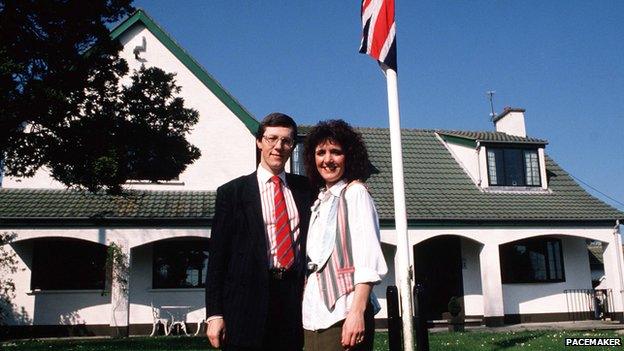
Peter and Iris Robinson, pictured outside their east Belfast home in 1989
29 December 1948: Mr Robinson is born in Belfast. He is educated at the city's Annadale Grammar school and later at what is now Belfast Metropolitan College.
1970: Mr Robinson marries Iris Collins, a partnership that would later take on political as well as personal significance, when the two later became a husband and wife team at Westminster. They go on to have three children together, two boys and one girl.
30 September 1971: Mr Robinson becomes one of the founder members of the Democratic Unionist Party, having being spurred on to enter politics following the death of a school friend, Harry Beggs, killed that year in an IRA bombing at the Northern Ireland Electricity headquarters.
1975: An estate agent by profession, he leaves his job to become the DUP's first general secretary.
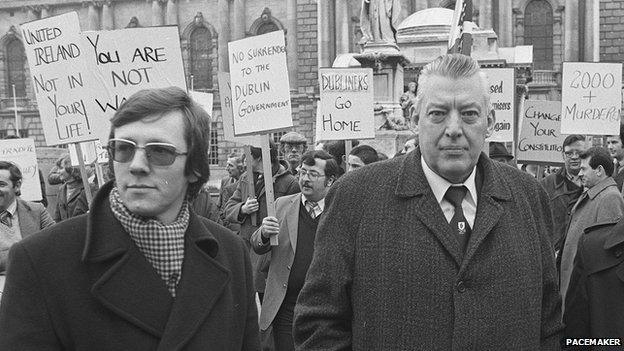
Peter Robinson with his long-time mentor Ian Paisley at a protest in Belfast in 1981
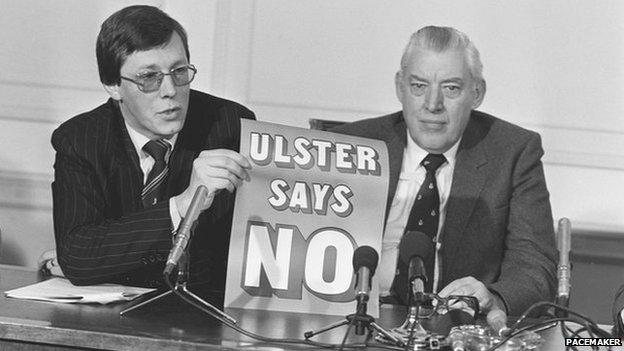
Peter Robinson and Ian Paisley promoted their Ulster Says No message in protest at the 1985 Anglo-Irish Agreement
3 May 1979: In the general election, he is elected as MP for East Belfast for the first time. He beats the Ulster Unionist Party candidate William Craig by just 64 votes, external.
1980: Mr Robinson begins a long stint as deputy leader of the DUP behind Ian Paisley.
1982: He is elected to the re-established Northern Ireland Assembly, serving until its dissolution four years later.
9 June 1983: He increases his majority at Westminster in the general election, external to 7,989.
17 December 1985: Mr Robinson is one of 15 unionist MPs to resign their seats and force by-elections in protest at the Anglo-Irish Agreement, which gives the Republic of Ireland a consultative role in Northern Ireland.
23 January 1986: Mr Robinson increases his majority to 21,690 in a by-election, external.
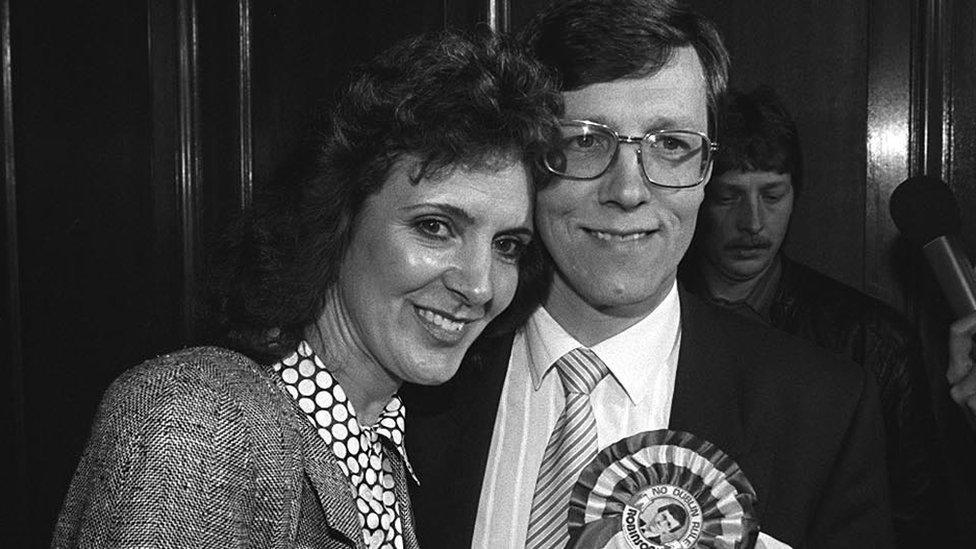
Iris Robinson followed her husband into politics and both served as MPs, MLAs and councillors
7 August 1986: Mr Robinson marches with a group of loyalists into the County Monaghan village of Clontibret, in protest against what he claimed were inadequate security measures along the Irish border, following Margaret Thatcher's signing of the 1985 Anglo-Irish Agreement. Later that year, Mr Robinson was photographed wearing a beret at a rally of the paramilitary Ulster Resistance movement.
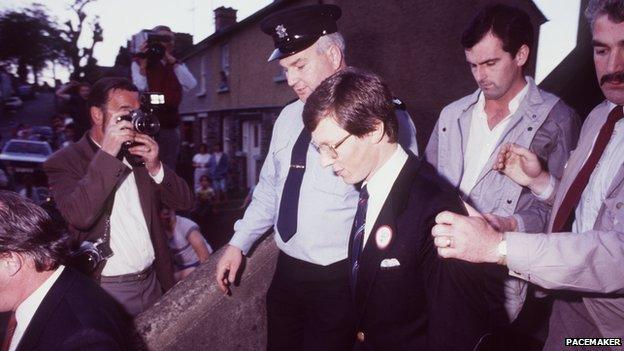
Peter Robinson was brought to court in the Republic of Ireland in 1986 after leading an "incursion" into the border village of Clontibret in protest against the Anglo-Irish Agreement
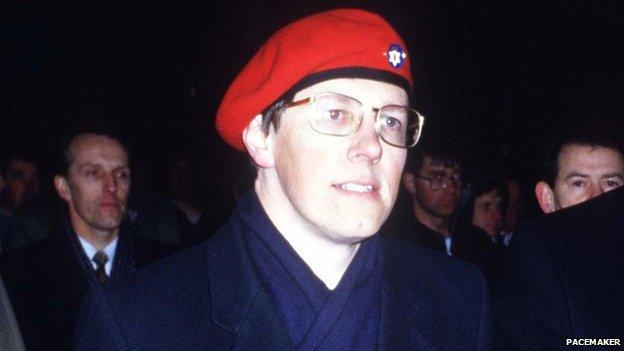
Mr Robinson was photographed wearing a beret at a rally of the paramilitary Ulster Resistance movement
16 January 1987: Mr Robinson pleaded guilty in a Dublin court to unlawful assembly in Clontibret . He paid £17,500 in fines, external and compensation and is freed.
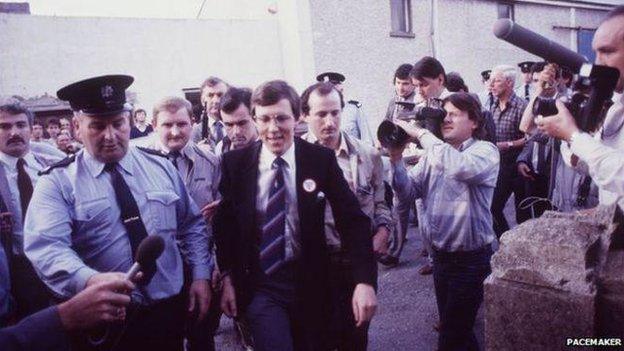
Mr Robinson, pictured after his first court appearance over the Clontibret affair
2 July 1987: He is an author of a report published, external by the Unionist Task Force which explored an alternative to the Anglo-Irish Agreement. Frank Millar, General Secretary of Ulster Unionist Party (UUP) is a co-author. Both resigned from their positions after the two party leaders fail to respond to the report. Mr Robinson returned to his position later.
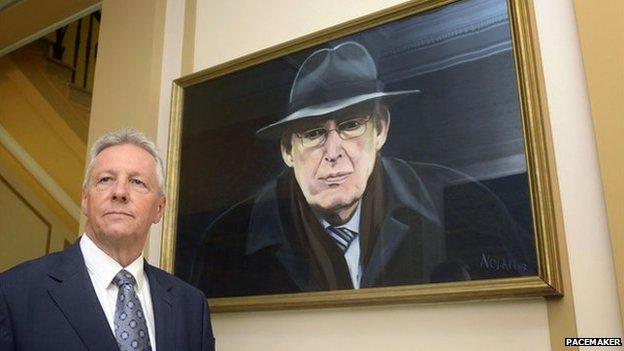
Peter Robinson's relationship with his late mentor Ian Paisley has been described as one of the longest apprenticeships in UK politics
April 1998: Together with the rest of the DUP, Mr Robinson campaigns against the Good Friday Agreement, citing their opposition to aspects like the release of paramilitary prisoners.
November 1999: Mr Robinson takes office as minister for regional development. While he refuses to attend Stormont Executive meetings, he impressed his civil servants with his grasp of the detail of his brief. He claimed credit, amongst other things, for introducing free travel for the elderly.
5 July 2000: Mr Robinson and social affairs minister Nigel Dodds resign, external, following the anti-agreement party's failure to win sufficient support for a motion to remove Sinn Féin from the power-sharing executive.
8 June 2001: Iris Robinson is elected as an MP, external for Strangford, and the couple becomes the first husband and wife team to represent Northern Ireland in parliament.
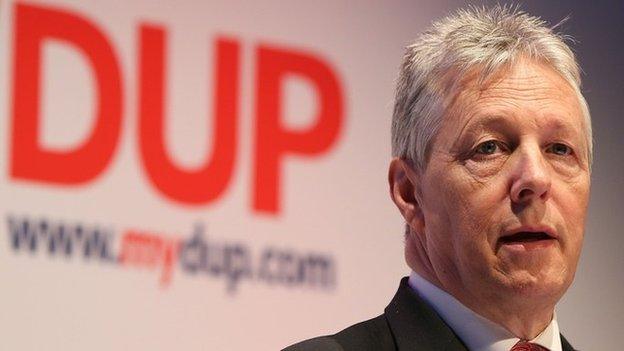
Peter Robinson was a founding member of the DUP who went on to lead his party in government
2006: Mr Robinson is instrumental in the drafting of the St Andrew's Agreement, and his party's decision to enter government with Sinn Féin is a huge shift in DUP policy.
16 April 2007: After the restoration of devolution, he took the finance ministry, external and helped make revitalising the local economy the main theme of the new Stormont Executive's programme for government.
5 June 2008: Peter Robinson becomes Northern Ireland's first minister, external and DUP leader. He takes over both positions from the 82-year-old Ian Paisley, who had stood down in May.
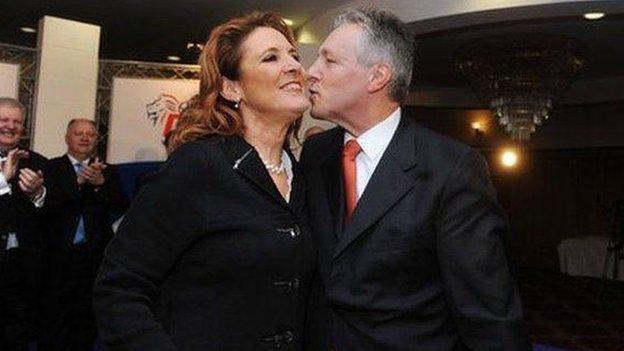
30 December 2009: Iris Robinson announces she is quitting politics, external, revealing that she is battling mental illness. Mrs Robinson steps down from her roles as an MP, an assembly member and a councillor. "The stress and strain of public life comes at a cost and my health has suffered," she said.
5 January 2010: After months of investigating, BBC Northern Ireland's Spotlight programme puts a series of questions to Peter Robinson about his wife's financial affairs.
6 January 2010: Peter Robinson says his wife tried to kill herself while suffering depression after she had an affair. In a series of televised interviews, external, he says first learned of the affair on the night Mrs Robinson attempted suicide. He said he had forgiven Iris and that they would attempt to save their marriage. He insisted the revelations would not undermine his role as first minister.
7 January 2010: Allegations about Iris Robinson's financial affairs, external are broadcast BBC Northern Ireland current affairs programme Spotlight.
11 January 2010: Mr Robinson announces he is temporarily standing down as first minister, external, and is replaced by party colleague Arlene Foster.
4 February 2010: He resumes his role, external less than a month later.
30 March 2010: A BBC investigation reveals, external that Mr Robinson bought a valuable piece of land from a developer for £5. The deal enabled Mr Robinson to sell part of his back garden for more than £500,000.
2 April 2010: Mr Robinson responds to the BBC story and denies that he did anything wrong, external when he bought a piece of land next to his home from a developer for £5. He tells the BBC that the sum paid to Fred Fraser was "nominal" because the land was "useless" to the developer.
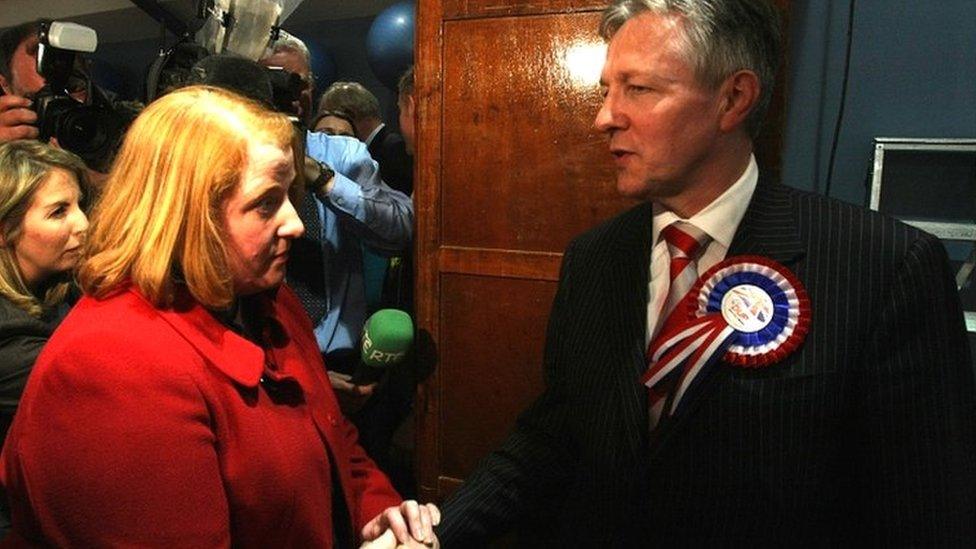
Peter Robinson loses his East Belfast seat to the Alliance Party's Naomi Long
7 May 2010: Mr Robinson loses the Westminster seat, external he had held for more than 30 years to Naomi Long of the Alliance Party.
6 April 2011: He became the first DUP leader to attend a Catholic Mass, as a mourner at the funeral of murdered police officer, Ronan Kerr.
24 June 2011: Mr Robinson announced plans to reach out to Catholic voters.
30 January 2012: He attends his first Gaelic Athletic Association (GAA) match with Deputy First Minister Martin McGuinness.
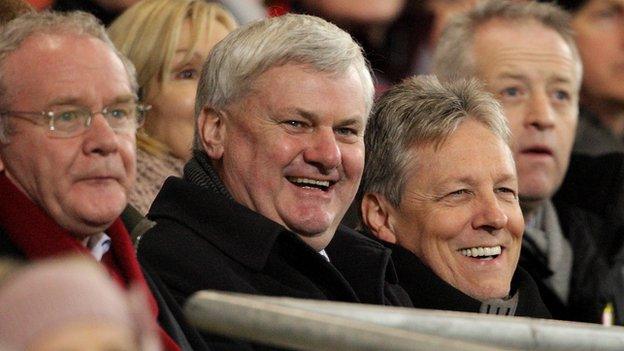
Peter Robinson attended his first GAA march in 2012, alongside Sinn Fein's Martin McGuinness (left)
27 June 2012: Mr Robinson stood alongside Mr McGuinness when the Sinn Fein MLA shook hands with the Queen for the first time. Mr Robinson said: "We recognise that this will be a difficult ask for Her Majesty The Queen and a significant step for republicans."
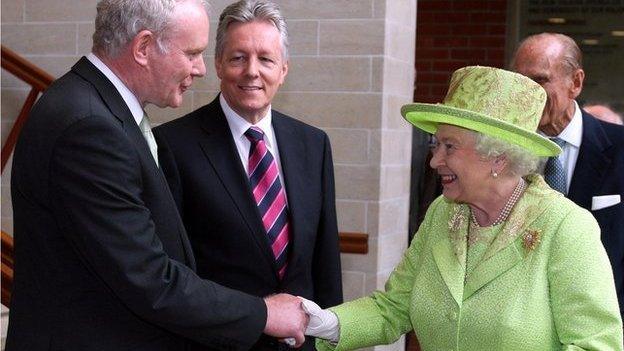
Sinn Fein's Martin McGuinness met the Queen for the first time in June 2012
22 May 2013: Mr Robinson holds a Stormont meeting with PIMCO, a California-based global investment company interested in buying the National Assets Management Agency's (Nama) Northern Ireland loan portfolio.
20 January 2014: In a BBC programme, former DUP leader Ian Paisley and his family are scathing about the current party leadership. The DUP says many colleagues felt "hurt by untrue and bitter comments contained in the documentary".
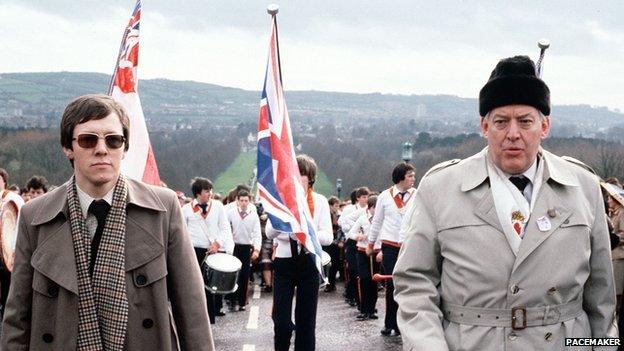
Peter Robinson and Ian Paisley marched together at a political rally at Stormont in 1981
3 June 2014: Mr Robinson met with Muslim community leaders and made a public apology for comments he made defending a pastor who called Islam "heathen" and "satanic".
28 November 2014: A report by the Committee on Standards and Privileges on BBC Spotlight's 2010 investigation into his wife's financial relationship with a teenage cafe owner finds Mr Robinson did not breach the Northern Ireland Assembly's code of conduct.
8 May 2015: Gavin Robinson wins East Belfast for the DUP, the Westminster seat that the Alliance Party's Naomi Long had taken from Peter Robinson in 2010.
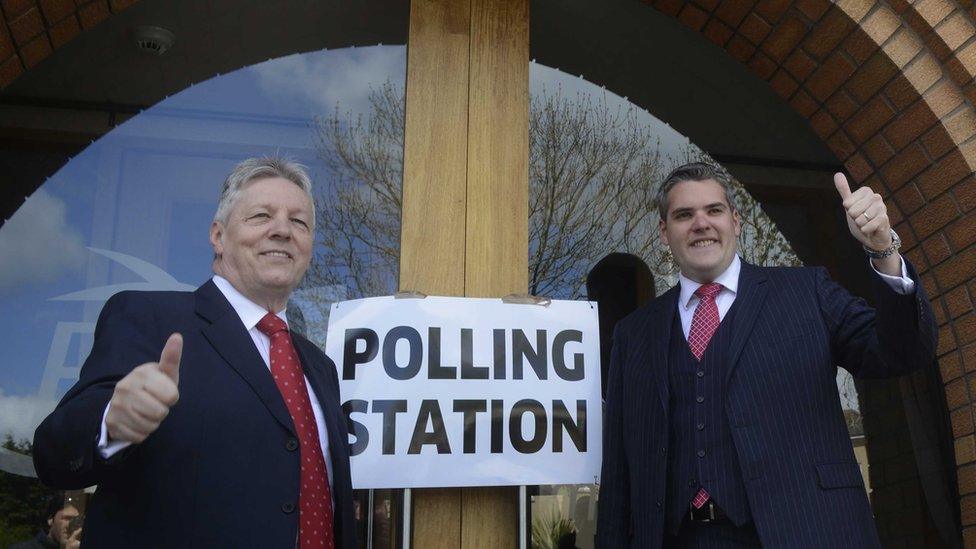
First Minister Peter Robinson supported Gavin Robinson in the DUP's successful bid to win back the East Belfast seat in the 2015 general election
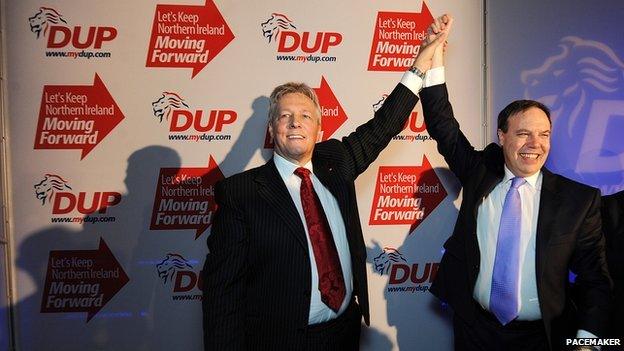
By 2011, a resurgent Peter Robinson was celebrating DUP success in the Northern Ireland Assembly elections
26 May 2015: Mr Robinson is treated in hospital for a heart attack. He returns to work several days later, saying his health issues were nothing to do with the stress of his job, but blamed his diet and lack of exercise.
10 September 2015: Mr Robinson and all but one of his DUP colleagues step aside as a result of the political crisis in the Stormont. The crisis was sparked by the murder of ex-IRA man Kevin McGuigan in August 2015.
14 October 2015: Mr Robinson appeared before a parliamentary inquiry investigating whether he benefited from a £1.24bn property deal. The deal concerned the Republic of Ireland's state-owned back National Asset Management Agency (Nama). Mr Robinson denied suggestions he would benefit financially from Nama deal and said he held meetings with interested buyers "in the best interests of the economy". He contested claims that Deputy First Minister Martin McGuinness was kept in the dark about the deal.
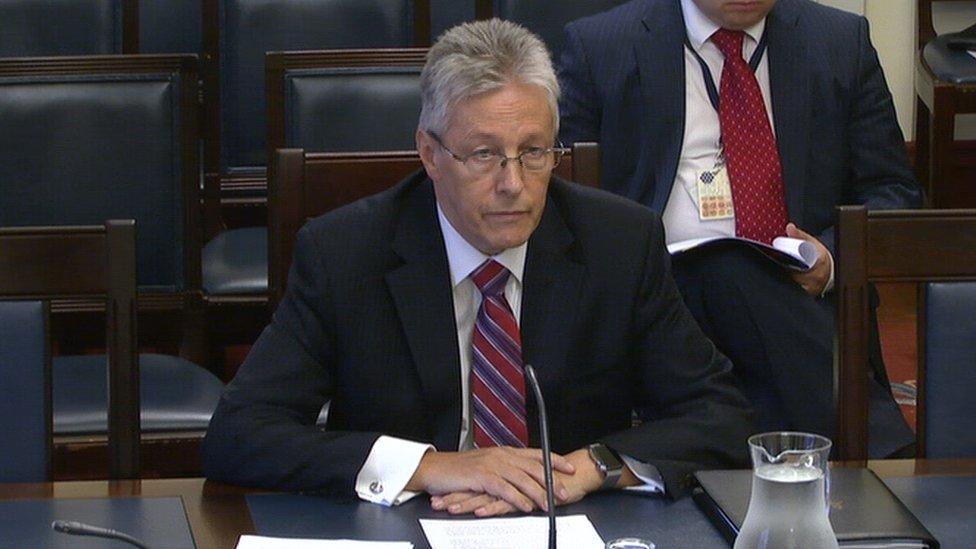
Mr Robinson said he "neither received, expected to receive, sought, nor was I offered a single penny" as a result of the sale
20 October 2015: Mr Robinson resumed his post as first minister after an official assessment of paramilitary activity was published.
5 November 2015: Belfast businessman Peter Curistan lodged a complaint to the PSNI about Mr Robinson, calling for an investigation into remarks made under parliamentary privilege nine years earlier. The comments alleged Mr Curistan was linked with "IRA dirty money". In a statement to the BBC responding to the complaint, Mr Robinson said: "The police may have to waste their time with this but I do not."
18 November 2015: A deal is reached between the the DUP, Sinn Féin and the British and Irish governments to resolve a serious of problems that had threatened the future of devolution at Stormont. The agreement, called 'A Fresh Start' includes a way forward on paramilitarism and welfare reform, but controversially, it does not address how to deal with the legacy of the Troubles.
20 November 2015: Mr Robinson announces he is to step down as Northern Ireland first minister and DUP leader within weeks. He tells the BBC the latest political deal had "stabilised" Stormont and now seems the "appropriate time" to quit
- Published19 November 2015
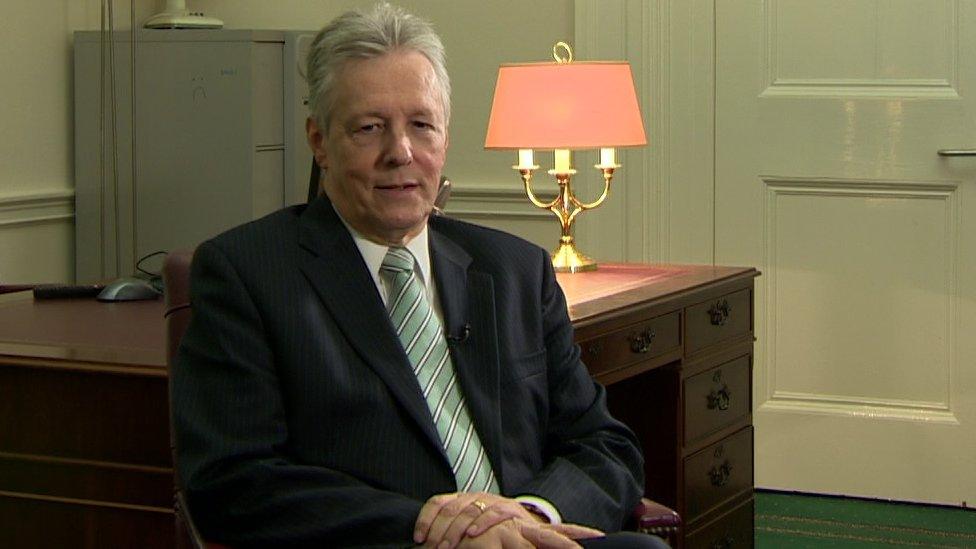
- Published19 November 2015
